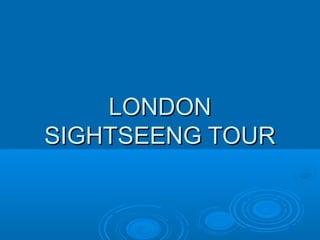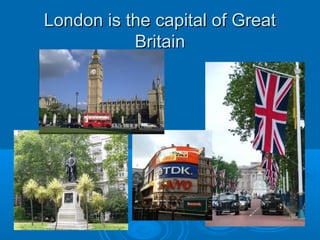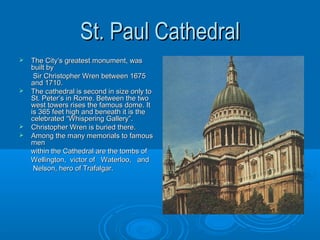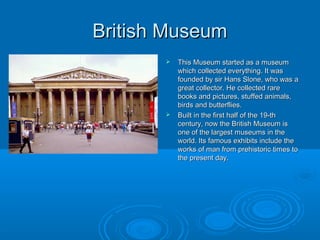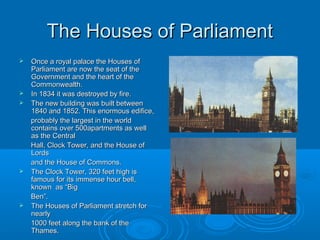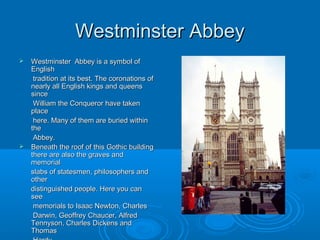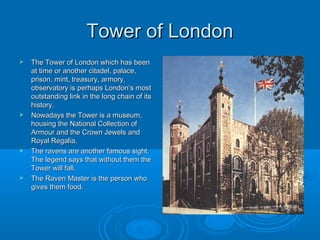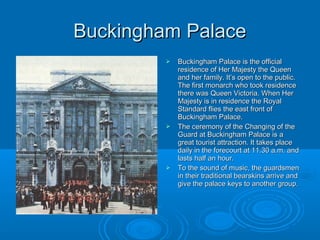London sightseeing tour
- 2. London is the capital of Great Britain
- 3. St. Paul Cathedral ï The Cityâs greatest monument, was built by Sir Christopher Wren between 1675 and 1710. ï The cathedral is second in size only to St. Peterâs in Rome. Between the two west towers rises the famous dome. It is 365 feet high and beneath it is the celebrated âWhispering Galleryâ. ï Christopher Wren is buried there. ï Among the many memorials to famous men within the Cathedral are the tombs of Wellington, victor of Waterloo, and Nelson, hero of Trafalgar.
- 4. British Museum ï This Museum started as a museum which collected everything. It was founded by sir Hans Slone, who was a great collector. He collected rare books and pictures, stuffed animals, birds and butterflies. ï Built in the first half of the 19-th century, now the British Museum is one of the largest museums in the world. Its famous exhibits include the works of man from prehistoric times to the present day.
- 5. The Houses of Parliament ï Once a royal palace the Houses of Parliament are now the seat of the Government and the heart of the Commonwealth. ï In 1834 it was destroyed by fire. ï The new building was built between 1840 and 1852. This enormous edifice, probably the largest in the world contains over 500apartments as well as the Central Hall, Clock Tower, and the House of Lords and the House of Commons. ï The Clock Tower, 320 feet high is famous for its immense hour bell, known as âBig Benâ. ï The Houses of Parliament stretch for nearly 1000 feet along the bank of the Thames.
- 6. Westminster Abbey ï Westminster Abbey is a symbol of English tradition at its best. The coronations of nearly all English kings and queens since William the Conqueror have taken place here. Many of them are buried within the Abbey. ï Beneath the roof of this Gothic building there are also the graves and memorial slabs of statesmen, philosophers and other distinguished people. Here you can see memorials to Isaac Newton, Charles Darwin, Geoffrey Chaucer, Alfred Tennyson, Charles Dickens and Thomas
- 7. Tower of London ï The Tower of London which has been at time or another citadel, palace, prison, mint, treasury, armory, observatory is perhaps Londonâs most outstanding link in the long chain of its history. ï Nowadays the Tower is a museum, housing the National Collection of Armour and the Crown Jewels and Royal Regalia. ï The ravens are another famous sight. The legend says that without them the Tower will fall. ï The Raven Master is the person who gives them food.
- 8. Buckingham Palace ï Buckingham Palace is the official residence of Her Majesty the Queen and her family. Itâs open to the public. The first monarch who took residence there was Queen Victoria. When Her Majesty is in residence the Royal Standard flies the east front of Buckingham Palace. ï The ceremony of the Changing of the Guard at Buckingham Palace is a great tourist attraction. It takes place daily in the forecourt at 11.30 a.m. and lasts half an hour. ï To the sound of music, the guardsmen in their traditional bearskins arrive and give the palace keys to another group.
- 9. Thank you for your attention!
- 10. Thank you for your attention!
